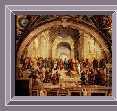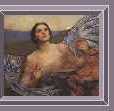
Treatments of God and the American Church
The United States of America has always suffered from a curious juxtaposition. In the attempt to liberate man from repressive governmentally rule and to religious freedom, the American has consequently - perhaps unwittingly - allowed for "liberation" from God's rule under the name of religious freedom.
Emily Dickinson's poem number 324, "Some keep the Sabbath going to Church - " (Dickinson 2567) is clearly an anti-puritanical poem, following in the tradition of Walt Whitman's liberated verse and Emerson's ideology. It criticizes the church as she saw it, as well as espousing a more natural religion.
The meaning of the poem is summed up best in the first and last lines: "Some keep the Sabbath going to Church - /I keep it, staying at home - " and "So instead of getting to Heaven at last - /I'm going, all along." The comma after "I keep it" makes that one phrase wry, adding a "punch" to the second half of the line. The same holds true for the comma splice in the last line that emphasizes the phrase "all along" in contrast to the seemingly innocuous "at last" from the previous line. The meaning of the poem might be surmised thus: While most people hypocritically go to service, she actually practices her religion - without going to church. This is a celebration of the Protestantism that formed this country, and that, at its extreme, renounces all need for formal or communal worship: liberation from the Catholic Church, which Christ instituted, to the Protestant Church, founded by misinformed but ardent believers, to the beginnings of spiritism, as seen here in "free worship," to today's existential but "liberated" malaise.
 Dickinson takes this to another level, though, by marrying liberated Protestantism with deism or pantheism: "With a Bobolink for a Chorister - /And an Orchard, for a Dome - ". For Dickinson God is found in nature and not in clapboard meeting houses. A bird is her sexton, and God preaches directly to her. This way of worship provides her with "Wings" already, rather than those who "keep the Sabbath in Surplice -".
Dickinson takes this to another level, though, by marrying liberated Protestantism with deism or pantheism: "With a Bobolink for a Chorister - /And an Orchard, for a Dome - ". For Dickinson God is found in nature and not in clapboard meeting houses. A bird is her sexton, and God preaches directly to her. This way of worship provides her with "Wings" already, rather than those who "keep the Sabbath in Surplice -".
Puritanism, particularly Congregationalism-to which her family subscribed (McQuade 2559) -is subtly criticized in her description of natural worship. She does not toll a bell, a funeralistic image, but sings, a Whitmanesque liberality. She also says that "God preaches, a noted Clergyman - /And the sermon is never long," implying that in the Congregational Church God can not preach, or is seen as just an incidental sermonizer, and that the pastors of the church "doth protest too much (Shakespeare, Hamlet III.ii.)" - and too long.
Dickinson's view may be contrasted with Phyllis Wheatley's poem "On Being Brought from Africa to America" (Wheatley 505-506). Although separated by a hundred years, these two female poets present interesting and distinct views on the Protestant church in Massachusetts, and on God. While the first sees "liberty" from the Puritan religion as concordant with Liberty from governance, Wheatley sees Christ (in whatever form of worship) as Liberty from Paganism, and to whom God has called her to be. Wheatley writes that "'Twas mercy brought me from my Pagan land," a direct contradiction to Dickinson's move toward Deism in poem 324. Like Dickinson she believes that "there's a God," but, unlike Dickinson, "there's a Saviour too/Once I redemption neither sought nor knew." Wheatley recognizes and embraces the redemptive power of God's grace and church, which Dickinson seems to ignore or reject (as especially seen in her "death" poems). Wheatley's understanding of God and His church is more traditional than Dickinson's, which Wheatley might label "Pagan," but her criticisms of the members of the congregation are essentially similar.
Wheatley speaks of the "some" that "view our sable race with scornful eye" and cautions the "Christians" to act as Christians and remember that "Negroes, black as Cain,/May be refin'd, and join th'angelic train." Like Dickinson's line: "I just wear my Wings," Wheatley is asserting her role in God's creation already. But again, the emphasis lies not on the individual quality, as Dickinson's reclusiveness lends to her poetry, but on the redemptive quality of a people through God and His church.
In order to understand this contrast, one must recognize the historical and biographical differences between the two women. Wheatley, a former slave, lived in a time that was less anti-puritanical, a time that still rejoiced in newly found religious freedom. Wheatley, as a female and as a former slave, was also constantly aware of her unusual "freedom" and the bondage of her fellow women and race. Her poem is much more overtly didactic than Emily Dickinson's is, then, precisely because of her sense of community with other women and Africans, whereas Dickinson's poem is highly personal, because of her chosen life as a recluse.
 By tracing the evolution of these two poems, we can begin to see the formation of modern isolationist man. Wheatley, coming out of a society that was more community based, accepted the church as her foundational religion, even though she saw some inherent difficulties in the Protestant church, especially in their treatment of Negroes. (This is not to expiate the Catholic Church from any wrong-doing her members have committed, but rather is an acknowledgement that America is, at her roots, formation, and present condition, Protestant.) Her poem then addresses the community of the church on behalf of the community of Negroes. Dickinson, who might have approached her poem in the same way, instead focused on the "me" and "my" of her religion, spurned the human communal aspect, and took Nature as her guide and god. Wheatley is more didactic and earnest, while Dickinson is more critical and wry. The movement in America, in respect to God and any church, then becomes increasingly isolationist and arbitrary. While Wheatley rejoices in a society that allows for religious freedom, Dickinson rejoices in religious liberality, what will become religious anarchy in our own day and age.
By tracing the evolution of these two poems, we can begin to see the formation of modern isolationist man. Wheatley, coming out of a society that was more community based, accepted the church as her foundational religion, even though she saw some inherent difficulties in the Protestant church, especially in their treatment of Negroes. (This is not to expiate the Catholic Church from any wrong-doing her members have committed, but rather is an acknowledgement that America is, at her roots, formation, and present condition, Protestant.) Her poem then addresses the community of the church on behalf of the community of Negroes. Dickinson, who might have approached her poem in the same way, instead focused on the "me" and "my" of her religion, spurned the human communal aspect, and took Nature as her guide and god. Wheatley is more didactic and earnest, while Dickinson is more critical and wry. The movement in America, in respect to God and any church, then becomes increasingly isolationist and arbitrary. While Wheatley rejoices in a society that allows for religious freedom, Dickinson rejoices in religious liberality, what will become religious anarchy in our own day and age.
Melville's Moby Dick takes a different approach to this question that has afflicted America ever since the Puritans first stepped foot on this soil. In Chapter 65, Stubb's Supper (Melville 251-254), a very unusual sermon is delivered by a Negro to Nature, which may be seen as a sort of link between Wheatley and Dickinson. In the sermon, the African cook is told by Stubb to tell the sharks to stop eating so "woraciously." Cook's first attempt at such a "sermon" is peppered with swears at the noisy sharks. Stubb reprimands Cook, and Cook continues in a more "gentlemanly" fashion. Cook then expounds, forgiving the sharks for their fallen nature, but cautioning them to "gobern de shark in you" in order to become an "angel." He also mentions that some of the sharks have bigger mouths but smaller stomachs, and their job is to cut off the blubber from the whale for the smaller sharks to eat. Finally he reminds the sharks that "dat whale belong to some one else."
This sermon can be viewed in a number of ways. On the face, the irony of anyone preaching to sharks is amusing and provides comic relief in such a novel, but Melville is the master of symbolism and one must look beyond the face value. As Cook reflects: "I'm bressed if he ain't more of shark dan Massa Shark hisself." If the sharks are then seen as the average man, or further (taking into account the "sermon" aspect of Cook's speech) as the average churchgoer, and the whale as God's church, the speech takes on greater significance. The "sharks" are fallen who must "gobern the shark" in order to become an angel, "wear…Wings" and "join th'angelic train." Like Wheatley, this African questions these churchgoers: "Is not one shark dood right as toder to dat whale?" meaning, is not one man as good as another within the church? Further, there are those poets and saints who have a larger capacity ("mouths") for understanding the church, but stomachs of just the same size as any other, whose duty it is to not become a recluse, but to feed the others of the congregation. Cook addresses the sharks as "fellow-critters" and "bred'ren," again bringing in the communal aspect of the church, while criticizing the movements of individuals. His statement that the whale belongs to someone else may seem to imply that the whale belongs to Stubb, but in the subcontext and the context eventually apparent through the novel, indicates that the whale is God's creation - in this case, the church.
The connection with Wheatley is apparent in the didactic element of Cook, as well as the Cook's nationality and sense of community. Like both Wheatley and Dickinson, there is an emphasis on the "angelic" - the limited Protestant answer to sainthood, in accordance with Paul's epistolary greetings (cf. 1 Cor 1:2, etc.). And in conjunction with Dickinson, Cook preaches not to men, but to animals, as Dickinson's sexton was a bird. But even Melville seems to see the dilemma that Dickinson's simple poem poses. Man preaching to animals is useless, and even more, comical. Man preaching to fellow man may seem likewise problematical if every man has more of the shark in him than "Massa Shark hisself." Deism sounds pleasant, but is a dead-end. Cook is sermonizing to the animal sharks, when he should have been sermonizing to Stubb.
Melville may also be chastising Dickinson and those like her who would tear off a piece of the whale, of the church, for herself, but not share her findings with others. Melville would encourage the Dickinsons of the world to remain in the world and help their churches rather than leaving them or turning a deaf ear to the preacher. This congressional deafness is repeated in chapter 9, "The Sermon" (Melville 44-51) when Father Mapple delivers his sermon on Job and the necessity of obeying God. After his final exhortation, however, he covers his face with his hands and kneels in a posture that would seem to indicate woe or grief - possibly for his "deaf sharks." Father Mapple is also a former seaman who gave up the life to tend to these sharks, to feed them the blubber of the whale that he bit off.
 Perhaps the most poignant reminder of the necessity for church in Melville's treatment of Cook's sermon is the chastisement to remember that the "whale" does not belong to man, but to God, and must be respected as sacrosanct. Dickinson's poem may have some validity in her criticisms of the church as she saw it, but in rejecting the members of the congregation, she rejected the church as well. Melville's opinion, which is far more in line with Wheatley's poem than Dickinson's, is the better of the two, but has not been accepted by the world today. In our age, any home or barn or ditch may be regarded as the holy of holies. The church, the whale, is the property of man, not of God. But that is the result of "freedom of religion" - we are free to reject or recreate religion, and from there, to reject or recreate our image of God as well. The Protestant church, coming from the Catholic Church, is a better alternative to Orchard Duomos, but can never take the place of that founded by Christ Himself.
Perhaps the most poignant reminder of the necessity for church in Melville's treatment of Cook's sermon is the chastisement to remember that the "whale" does not belong to man, but to God, and must be respected as sacrosanct. Dickinson's poem may have some validity in her criticisms of the church as she saw it, but in rejecting the members of the congregation, she rejected the church as well. Melville's opinion, which is far more in line with Wheatley's poem than Dickinson's, is the better of the two, but has not been accepted by the world today. In our age, any home or barn or ditch may be regarded as the holy of holies. The church, the whale, is the property of man, not of God. But that is the result of "freedom of religion" - we are free to reject or recreate religion, and from there, to reject or recreate our image of God as well. The Protestant church, coming from the Catholic Church, is a better alternative to Orchard Duomos, but can never take the place of that founded by Christ Himself.
The tragedy of America is her apparent "freedom." In her progression towards "liberty," as seen in Wheatley and Melville, she has won Liberalism, as Dickinson presents, and has now entered the age of the Libertine. In the Puritan's initial and honorable attempt to win the right to worship, we their descendents have progressed to the right not to worship. To paraphrase Dickinson, "we're going, all along" - and it will only be through "mercy" that we shall be brought out of our own "Pagan land" to treat the God, and that which He founds and ordains, with the respect He deserves.
Some keep the Sabbath going to Church -
Some keep the Sabbath in Surplice -
God preaches, a noted Clergyman -
Poem 324
I keep it, staying at Home -
With a Bobolink for a Chorister -
And an Orchard, for a Dome -
I just wear my Wings -
And instead of tolling the Bell, for Church,
Our little Sexton - sings.
And the sermon is never long,
So instead of getting to Heaven at last -
I'm going, all along.
 Top
Top



 © 9 December, 1998
© 9 December, 1998
Updated 13 June, 2000
All Rights Held by the Author.
No part of these pages may be used or copied without express permission of the author.
